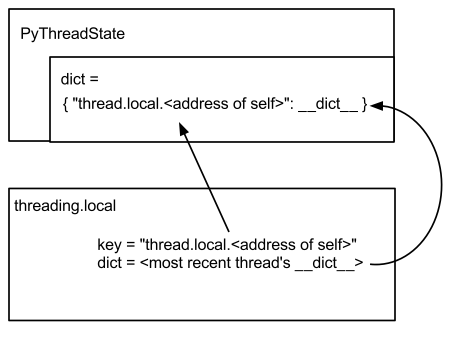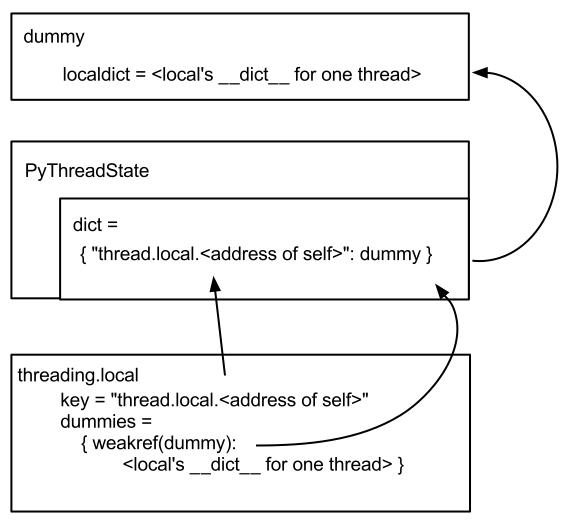Python's Thread Locals Are Weird
The Weirdness
What do you think this script prints?:
import thread, threading, sys
class Weeper(object):
def del(self):
sys.stdout.write('oh cruel world %s\n' % thread.get_ident())
local = threading.local()
def target():
local.weeper = Weeper()
t = threading.Thread(target=target)
t.start()
t.join()
sys.stdout.write('done %s\n' % thread.get_ident())
getattr(local, 'whatever', None)
If you guessed something like this:
oh cruel world 4475731968
done 140735297751392...then you'd be right, in Python after 2.7.1. In Python 2.7.0 and older (including the whole 2.6 series), the order of messages is reversed:
done 140735297751392
oh cruel world 140735297751392In New Python, the Weeper is deleted as soon as its thread dies, and
__del__ runs on the dying thread. In Old Python, the Weeper isn't
deleted until the thread is dead and a different thread accesses the
local's __dict__. Thus the Weeper is deleted at the line
getattr(local, 'whatever', None), after the thread dies, and
Weeper.__del__ runs on the main thread.
What if we remove the getattr call? In Old Python, this happens:
done 140735297751392
Exception AttributeError: "'NoneType' object has no attribute 'get_ident'"
in <bound method Weeper.__del__ of <__main__.Weeper object at 0x104f95590>>
ignoredWithout getattr, the Weeper isn't deleted until interpreter shutdown.
The shutdown sequence is complex and hard to predict—in this case the
thread module has been set to None before the Weeper is deleted, so
Weeper.__del__ can't do thread.get_ident().
Thread Locals in Old Python
To understand why locals act this way in Old Python, let's
look at the implementation in C. The core interpreter's PyThreadState
struct has a dict attribute, and each threading.local object has a
key attribute formatted like
"thread.local.. Each local has a __dict__
of attributes per thread, stored in PyThreadState's dict with the
local's key.
threadmodule.c includes a function _ldict(localobject \*self) which
takes a local and finds its __dict__ for the current thread.
_ldict() finds and returns the local's __dict__ for this thread,
and stores it in self‑>dict.

This architecture has, in my opinion, a bug. Here's the implementation
of _ldict():
static PyObject _ldict(localobject self)
{
/* get PyThreadState->dict for this thread */
PyObject tdict = PyThreadState_GetDict();
PyObject ldict = PyDict_GetItem(tdict, self‑>key);
if (ldict == NULL) {
ldict = PyDict_New(); /* we own ldict /
PyDict_SetItem(tdict, self‑>key, ldict);
Py_CLEAR(self‑>dict);
Py_INCREF(ldict);
self‑>dict = ldict; /* still borrowed */
if (Py_TYPE(self)->tp_init != PyBaseObject_Type.tp_init) {
Py_TYPE(self)->tp_init((PyObject*)self, self‑>args, self‑>kw);
}
}
/* The call to tp_init above may have caused another thread to run.
Install our ldict again. */
if (self‑>dict != ldict) {
Py_CLEAR(self‑>dict);
Py_INCREF(ldict);
self‑>dict = ldict;
}
return ldict;
}
I've edited for brevity. There's a few interesting things here—one is
the check for a custom __init__ method. If this object is a subclass
of local which overrides __init__, then __init__ is called whenever
a new thread accesses this local's attributes for the first time.
But the main thing I'm showing you is the two calls to
Py_CLEAR(self‑>dict), which decrements self‑>dict's refcount. It's
called when a thread accesses this local's attributes for the first
time, or if this thread is accessing the local's attributes after a
different thread has accessed them—that is, if self‑>dict != ldict.
So now we clearly understand why a thread's locals aren't deleted immediately after it dies:
- The worker thread stores a Weeper in
local.weeper._ldict()creates a new__dict__for this thread and stores it as a value inPyThreadState‑>dict, and stores it inlocal‑>dict. So there are two references to this thread's__dict__: one fromPyThreadState, one from local. - The worker thread dies, and the interpreter deletes its
PyThreadState. Now there's one reference to the dead thread's__dict__:local‑>dict. - Finally, we do
getattr(local, 'whatever', None)from the main thread. In_ldict(),self‑>dict != ldict, soself‑>dictis dereferenced and replaced with the main thread's__dict__. Now the dead thread's__dict__has finally been completely dereferenced, and the Weeper is deleted.
The bug is that _ldict() both returns the local's __dict__ for the
current thread, and stores a reference to it. This is why the
__dict__ isn't deleted as soon as its thread dies: there's a useless
but persistent reference to the __dict__ until another thread comes
along and clears it.
Thread Locals in New Python
In New Python, the architecture's a little more complex. Each
PyThreadState's dict contains a dummy for each local, and each local
holds a dict mapping weak references of dummies to a per-thread
__dict__.

When a thread is dying and its PyThreadState is deleted, weakref
callbacks fire immediately on that thread, removing the thread's
__dict__ for each local. Conversely, when a local is deleted, it
removes its dummy from PyThreadState->dict.
_ldict() in New Python acts more sanely than in Old Python. It finds
the current thread's dummy in the PyThreadState, and gets the
__dict__ for this thread from the dummy. But unlike in Old Python, it
doesn't store a extra reference to __dict__ anywhere. It simply
returns it:
static PyObject _ldict(localobject self)
{
PyObject tdict, ldict, dummy;
tdict = PyThreadState_GetDict();
dummy = PyDict_GetItem(tdict, self->key);
if (dummy == NULL) {
ldict = _local_create_dummy(self);
if (Py_TYPE(self)->tp_init != PyBaseObject_Type.tp_init) {
Py_TYPE(self)->tp_init((PyObject)self, self->args, self->kw);
}
} else {
ldict = ((localdummyobject *) dummy)->localdict;
}
return ldict;
}
This whole weakrefs-to-dummies technique is, apparently, intended to
deal with some cyclic garbage collection problem I don't understand very
well. I believe the real reason why New Python acts as expected when
executing my script, and why Old Python acts weird, is that Old Python stores
the extra useless reference to the \_\_dict\_\_ and New Python does not.
Update: I finally found the bug reports that describe Old Python's weirdness and 2.7.1's solution. See: